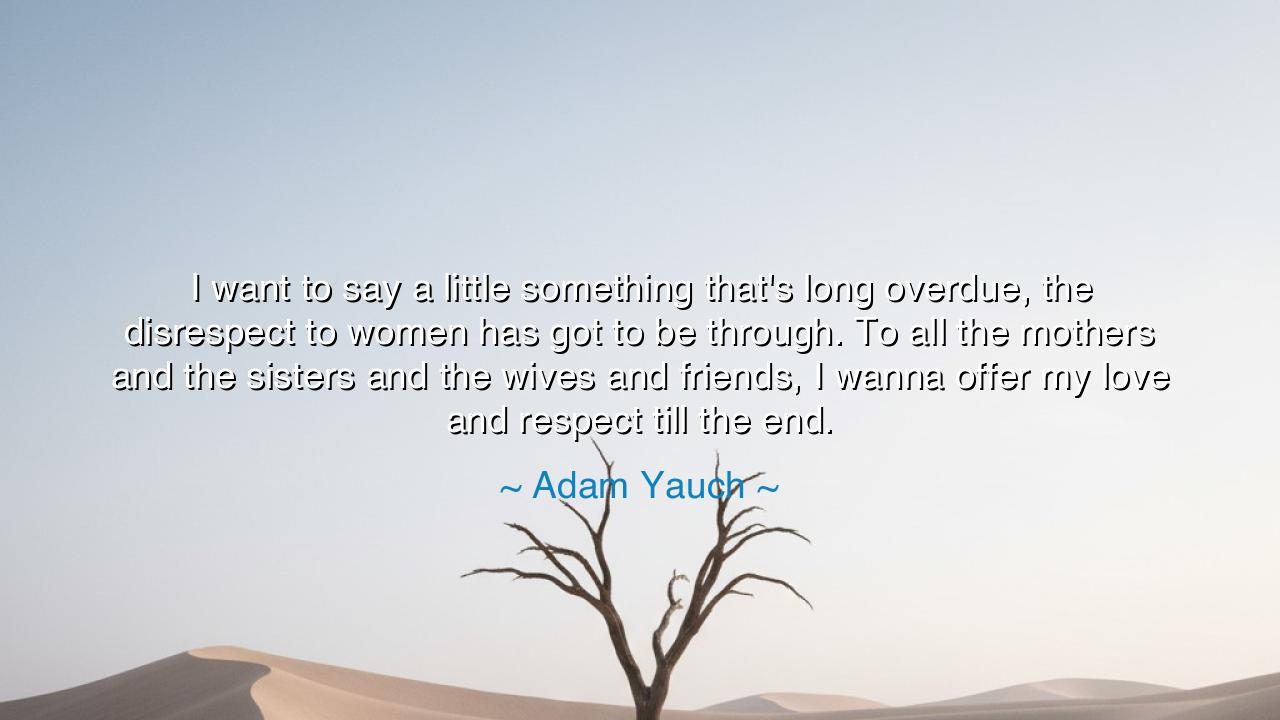
I want to say a little something that's long overdue, the
I want to say a little something that's long overdue, the disrespect to women has got to be through. To all the mothers and the sisters and the wives and friends, I wanna offer my love and respect till the end.






“I want to say a little something that's long overdue, the disrespect to women has got to be through. To all the mothers and the sisters and the wives and friends, I wanna offer my love and respect till the end.” Thus declared Adam Yauch, the voice of a generation, who rose not only to sing but to repent, to correct, and to teach. These words, woven into the fabric of his music, are more than rhyme and rhythm—they are confession, proclamation, and vow. In them lies the recognition of an ancient wrong, one that stretches across centuries: the disrespect of women. And in them lies the call to put an end to it.
The ancients often failed in this duty, for many societies placed women in shadows while men stood in light. Yet even among the ancients, there were voices who knew the truth. The poets praised mothers as the givers of life, philosophers honored wisdom when spoken by women, and prophets declared that the measure of a people is how they treat the least among them. Yauch stands in this tradition of awakening, proclaiming that respect must not be delayed, that it is not a gift to be granted at whim but a debt long owed.
Consider the story of the suffragettes in the early 20th century. Women marched, were beaten, imprisoned, and mocked, yet they refused to bow. They sought not privilege but equality—the simple dignity of having their voices heard. The world called them troublemakers, yet today we call them pioneers. Their struggle embodies what Yauch cried out for: that the disrespect to women must end, and that respect must become the daily bread of human relations.
Yauch himself was part of a band once known for youthful arrogance, sometimes careless with words. Yet he grew, as all men must, and recognized the harm such careless disrespect could sow. In his maturity, he did not hide from his past but instead spoke against it, using the power of his platform to turn hearts toward reverence. This is the mark of true wisdom: to see one’s error, to confess it openly, and to guide others toward a better way.
O children of the future, listen well: the call to respect women is not a burden, but a liberation. For in honoring the mothers, the sisters, the wives, and the friends, we restore balance to the world. Where there is disrespect, there is decay. But where there is love and respect, there is strength, harmony, and flourishing. To dishonor women is to dishonor the very source of life; to uplift them is to uplift the human race.
The lesson is clear: respect must not be delayed, nor conditional. It must be practiced daily, in speech, in action, in thought. Let no careless word demean, let no silent witness tolerate scorn, let no unjust system remain unchallenged. For if we are silent, the chain of disrespect endures. But if we act, if we teach, if we embody love and respect, we break that chain and forge a new one, linked by dignity and honor.
Therefore, let your practice be deliberate. Speak words that uplift. Defend those who are silenced. Teach the young that respect is not optional but essential. Remember always that it is “long overdue,” and that the responsibility rests with us to make it real.
So I say unto you: take up Adam Yauch’s vow. Let there be no more delay. Offer love and respect till the end, not as a fleeting sentiment but as a lasting way of life. For only then will the world rise into the harmony it was meant to know.






AAdministratorAdministrator
Welcome, honored guests. Please leave a comment, we will respond soon